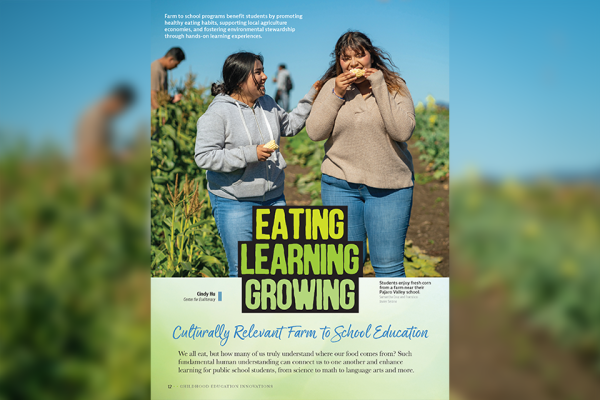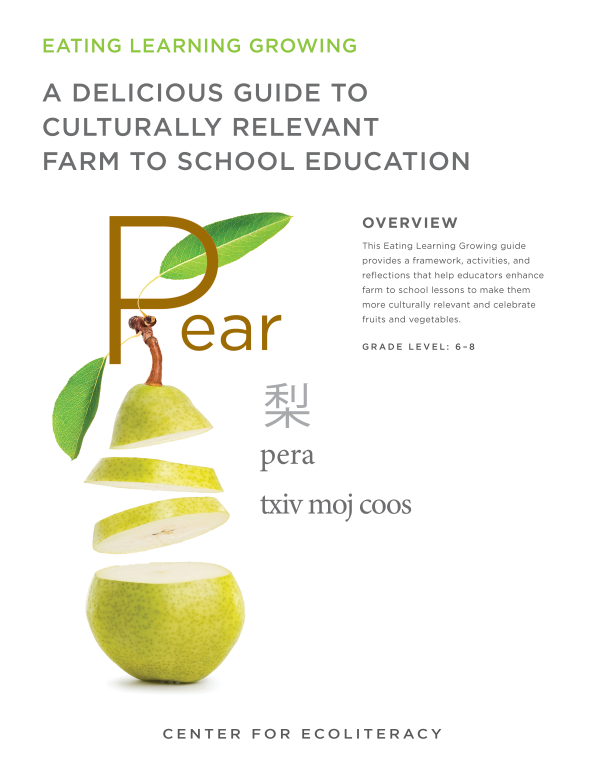Eating Learning Growing

Cindy Hu, Center for Ecoliteracy
This is an excerpt from an article published in the July/August 2024 issue of Childhood Education Innovations magazine. Read the full article.
We all eat, but how many of us truly understand where our food comes from? This fundamental human experience can connect us and enhance learning for public school students, from science to math to language arts and more.
All students deserve access to fresh and local food at school and opportunities to experience where their food comes from and how nature helps it grow. Yet in California, a state that produces nearly half of the country’s fruits and vegetables, many students do not have access to fresh, California-grown food at school.
The Center for Ecoliteracy is a nonprofit that advances change in the US public education and school food systems to support students and the people who nourish them. Based in California, we provide programming for educators, school nutrition professionals, and school communities on school food systems change, ecological education, and policy and advocacy.
California is home to the farm to school movement – an initiative that strives to connect local farms and schools to provide students with locally-sourced food in the cafeteria, classroom, and school garden. In 2020, the Center for Ecoliteracy advocated and won state funding for the California Department of Food and Agriculture to establish the Farm to School Incubator Grant Program. Since then, the state has invested nearly 100 million dollars to expand and sustain the farm to school program. We developed Eating Learning Growing to provide resources and professional development for farm to school educators.
Farm to school education is an opportunity for students to taste local foods, learn where their food comes from, and experience the cultures that celebrate them. Whether students live in an urban or rural environment, food can provide insight into the natural world and human society, providing pathways to observe, investigate, and learn.
What is Farm to School?
Farm to school education connects learning to the real world by helping students foster a deeper appreciation for local agriculture and healthy eating habits. Students experience and understand how nature supports life and the food they eat. Farm to school can take many forms, from classroom lessons to field trips in the school garden. Many programs include meeting farmers and farm workers to learn about the hard work that goes into growing food and the ecosystems that support healthy crops. For students, tasting locally grown fruits and vegetables engages their senses and provides experiential learning.
Educators can incorporate local food into the curriculum as a hands-on and engaging approach to teaching essential concepts about food, health, agriculture, and nutrition. When educators bring cultural relevance to farm to school education, they can create meaningful and engaging learning experiences for all students. And when this happens, students’ health, attendance, participation, and academic success can all improve.
Culturally Relevant Pedagogy
Culture is powerful, yet there are few formalized efforts to fully reflect the cultures and diversity of students in farm to school education. This lack of representation is a missed opportunity, as culturally relevant lessons have the potential to make learning about food, agriculture, and the environment more real while nourishing students’ bodies and minds.
Promoting culturally relevant pedagogy is a way to help all students succeed in school. The California Department of Education references Gloria Ladson-Billings' seminal article, "Toward a Theory of Culturally Relevant Pedagogy," and defines culturally relevant pedagogy as "a theoretical model that focuses on multiple aspects of student achievement and supports students to uphold their cultural identities. Culturally Relevant Pedagogy also calls for students to develop critical perspectives that challenge societal inequalities."
California has the largest agricultural economy in the country. Its farms, ranches, and food producers employ many students’ families. By featuring farmers from different backgrounds in educational materials, inviting them to speak to students, and creating opportunities for students to visit farms, students can see themselves as future farmers and understand the important role that agriculture plays in our society.
The Eating, Learning, Growing Guide
We believe that students learn best when they see their cultures and languages reflected at school and in the healthy fruits and vegetables they enjoy. The Eating Learning Growing guide and its framework, activities, and reflections are designed to help educators easily enrich existing lessons to include diverse topics, histories, learning styles, and customs.

Download Eating Learning Growing: A Delicious Guide to Culturally Relevant Farm to School Education
This guide provides a framework, activities, and reflections that support educators to enhance farm to school lessons to make them more culturally relevant and celebrate fruits and vegetables. Download the guide and watch the video.
This is an excerpt from an article published in the July/August 2024 issue of Childhood Education Innovations magazine. Read the full article.

